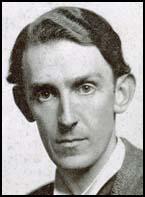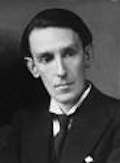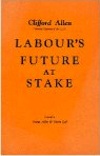DAVID HOWELL recounts the career of Clifford Allen, an ILP chairman and editor between the wars, whose marginalised political vision was, perhaps, a lost alternative for the party and the progressive movement.
Reginald Clifford Allen was born in Newport, Monmouthshire, on 9 May 1889. His father owned a drapery business; his mother died aged 35 in 1903. She left her son two legacies – precarious health and moral seriousness.
Clifford Allen, as he was always known, went to Berkhamsted School, University College Bristol, and between 1908 and 1911 to Peterhouse Cambridge. An Anglican, he had intended to take holy orders, but at Cambridge his Christianity gave way to secularism. Similarly his initial Conservatism was replaced by a progressive politics that initially combined social liberalism and ethical socialism. He was active in the university Fabian Society alongside Rupert Brooke.
After Cambridge he remained an active Fabian and joined the Independent Labour Party’s City of London branch. His political formation owed much to a progressive intellectual milieu, a culture of earnest debate, and little to any familiarity with working class life.
Experience of labour organisation soon followed. Allen was heavily involved in the emergence of a Labour newspaper, the Daily Citizen, and he demonstrated a flair for administrative tasks. The newspaper first appeared on 8 October 1912, but financial difficulties proved persistent and it ceased publication in May 1915. However, the period gave Allen many significant contacts within the Labour movement, most importantly, Ramsay MacDonald.
In the summer of 1914, Allen was one of a coterie of young graduates attracted to progressive politics and, often, to some form of socialism. The advent of war gave him a distinctive and heroic identity for his opposition to the war was total and unyielding.
He gave a lecture in October 1914 which was soon published as a pamphlet, Is Germany Right and Britain Wrong? The title was perhaps deliberately provocative, for Allen argued that no nation could be blamed more than any other: “Should then we Socialists have any dealings with this capitalist imbroglio? Far from it. Not only should we still condemn all wars, but above all, this war. They say our country is in danger. Of course it is, but whose fault is that?… We have to face the only possible outcome of our Socialist faith. I mean the question of non-resistance to armed force.”
Allen rigorously followed this precept. He was heavily involved in the formation of the No-Conscription Fellowship, although his precarious health meant he would have been exempt from military service. Nevertheless, once military conscription became law early in 1916 Allen claimed exemption on the grounds that his chairmanship of the NCF constituted essential war work. He refused non-combatant employment since it would release someone else for the services.
His claim was disallowed and on 11 August 1916 he was arrested. After being court-martialled and gaoled, he was subsequently released twice and re-arrested. On the second occasion he was sentenced to two years hard labour.
Allen’s health deteriorated severely during 1917, and a campaign for his release, and that of other absolutists, eventually proved successful at the end of the year. But Allen’s lungs had been permanently damaged and the remainder of his life was characterised by periods of intense political activity and bouts of debilitating illness followed by convalescence.
Iconic status
Allen’s war record gave him iconic status within the ILP. He personified the principled commitment of many party members in the face of militarism and xenophobia; his resistance to war was informed by liberal values, his socialist critique of the war’s origins notwithstanding. In campaigning for his release, Bertrand Russell affirmed that “he believes that it is only through liberty that human beings can develop, and that militarism is the great enemy of liberty”.
War had transformed the political terrain. Many on the left were attracted, or at least fascinated by the Bolshevik revolution and the Soviet regime’s survival against armed intervention and the hostility of other states. In 1920 Allen visited the Soviet Union as a member of a joint Labour Party and Trades Union Congress delegation. Attracted by the society’s egalitarianism, he feared the risk of a massive centralised bureaucracy enforcing discipline, achieving miracles of production and fostering a new form of imperialism.
Allen believed that in Britain a socialist society could be constructed without violence. He viewed the post-war ILP as a valuable resource in such a transition, believing the party could be an important think tank, developing policies for the Labour Party and for the wider movement.
Such an agenda required funds. Allen became treasurer of the ILP in 1922 and demonstrated an ability to raise money from a variety of progressive sympathisers. The ILP’s organisation became more professional; the party’s newspaper, the Labour Leader, became the New Leader; and HN Brailsford, a leading radical journalist, became editor. The weekly became renowned for the quality of its journalism, and a summer school was established where issues of policy and principle could be debated.
Yet, from the start, Allen had difficulty promoting his agenda for the ILP. Many within the ILP viewed their party not as a potential think tank but as the platform for socialist propaganda they had always imagined it to be. A few were beginning to envisage the party as the base for a left politics that would hold the Labour leadership to account for any departure from socialist rectitude. For his part, Allen was frequently dismissive of those in the ILP leadership he regarded as pedlars of slogans, unprepared to think through difficult issues of socialist policy.
Nevertheless, he became party chair in 1923 and began to emphasise the need to develop detailed policies based on thorough and scientific study, informed by a strong moral commitment.
The unexpected arrival of the first Labour government in January 1924 encouraged him to develop his ideas on both immediate and long-term strategy. And when the ILP conference met in York at Easter 1924 he spoke from the chair about the attitude socialists should take towards the minority Labour government.
His speech was carefully prepared. His “tall slight figure with a sensitive intelligent student’s face” commanded the respect of all. Allen counselled against impatience; reform necessitated careful preparation. Persuasion was the only way forward but the government should not be too cautious. Labour had more sympathy in the country than in the Commons; legislative and administrative initiatives could advance socialism.
Allen returned to these themes a year later at the party’s 1925 conference. The government’s defeat in the Commons and, decisively, in the consequential election, had sharpened his perspective. This became even more evident when he addressed that year’s summer school. He insisted that socialists should place a bold programme before voters. Such a campaign would be educational and, in Allen’s view, would be endorsed. Reason and evidence for him were powerful persuaders.
More specifically, Allen was preoccupied by the related problems of low wages and unemployment. He lamented the lack of a Labour policy on wages and urged a programme for the rapid takeover of some key industries. These thoughts prefigured the Living Wage programme, the most significant product of the study groups initiated by Allen.
Yet by the time this significant, controversial and ambiguous document, a challenge to the constricting economic orthodoxy, became available early in 1926, Allen and the ILP had effectively parted company. Increasingly, the party had become a focus for left criticism of MacDonald’s leadership, a shift personified by James Maxton, and a move Allen found uncomfortable.
Experience of office had deepened the animosity of many on the left towards MacDonald. Equally, MacDonald became increasingly dismissive of those he portrayed as uninformed and self-righteous. The critics characterised Allen as MacDonald’s man. His approach, with its blend of research and moral zeal, could seem too conciliatory. In turn, Allen readily dismissed his opponents as obstacles to any project for an effective socialist policy.
Resignation
Frustrated and weakened by illness, he resigned as chairman of the party’s National Administrative Council in October 1925 after a series of difficult meetings. The public presentation suggested a temporary absence on health grounds. The real reasons were personality and political differences; his sense of probity had been outraged. “I was alarmed not so much by the political decisions at which you arrived, for that could be overturned, but by the standard of political morality involved,” said Allen.
In private to MacDonald he effectively wrote off the ILP, saying: “I am rapidly coming to the conclusion that it is useless going on with these people, until a new group of loyal and reasonably intelligent colleagues can be found.”
Allen wanted to distance policymaking from party politics. A Labour programme should be the product of a few who had “no desire for the ordinary political life of Parliament … very alive and quite ambitious people … backed by all the expert knowledge of distinguished men in the civil service.”
Allen’s attenuated links with the Labour movement were destroyed by the crisis of 1931. Although ill, Allen publicly supported MacDonald both in his decision to lead a national government and in the subsequent election campaign that reduced Labour’s parliamentary presence to a rump. He argued that a national government was essential for the restoration of confidence and the Labour Party should have taken part. He expressed his views at length in the Manchester Guardian and the Times.
Allen’s apostasy was confirmed for many when he accepted a peerage in 1932. His arguments and responses to critics failed to recognise the sense of solidarity that had kept almost all Labour politicians, and many Labour sympathisers, united through the crisis. For many within Labour ranks Allen thereafter was a renegade, the apotheosis of the unreliable intellectuals who could be blamed simplistically for Labour’s disaster.
Allen’s subsequent career brought him disillusion. He failed in his aspiration to develop any significant presence for the Labour group within the national government, ignoring the group’s numerical weakness in the Commons.
Allen shifted his focus to the development of a broad progressive programme for the development of a modernised economy in which state planning would have an enhanced role. He was central to the formation in February 1935 of the Next Five Years Group. His collaborators included the dissident Tory Harold Macmillan and the economist Sir Arthur Salter. The Next Five Years, An Essay in Political Agreement, was published that July and supported by 153 political and literary figures, although supporters from the Labour movement were virtually absent.
Allen remained hostile to the Labour Party and deeply suspicious of Lloyd George’s Council of Action for Peace and Reconstruction. His initiative offered an agenda but one without an instrument, an example of the unsuccessful search for a British New Deal.
Increasingly, Allen became preoccupied by the deteriorating international situation and in particular by the desirability of improving Anglo-German relationships. He had always condemned the Versailles settlement and insisted that German grievances should be responded to sympathetically. He visited Hitler in January 1935 and the following year attended the Nuremburg Rally.
His concern for the pacification of Europe did not mean myopia about the brutality of the Nazi regime, however. He campaigned for political prisoners and condemned anti-Semitism. A dedicated appeaser, Allen acted as an intermediary in the Sudetenland crisis of 1938 and was a thorough defender of the Munich agreement.
That was his last political intervention. Exhausted and ill, he died in a sanatorium at Montana, Switzerland, on 3 March 1939.
Allen’s appearance was striking – a handsome head and auburn hair, a frailty and a reasoned yet passionate advocacy. In him, austere principle and resolute purpose were coupled with organisational skills. Some saw him as an assured practitioner of Machiavellian arts. He had a genius for friendship but broke with erstwhile colleagues rather than compromise his principles.
One characterisation presents him as a Labour renegade whose actions in 1931 condemned him to the margins. Another portrait, however, more sympathetic and perhaps more illuminating, presents him as a rational and humane liberal, a firm believer in the feasibility of a better society, one which could be described as socialist, perhaps, or as managed capitalism.
Yet the lack of an effective instrument for social change was a more fundamental dilemma for British progressives between the wars. Within this context, Allen’s marginalised vision for the ILP acquires significance as a supressed alternative.
—-
David Howell is Professor of Politics at the University of York and author of numerous books on the history of the Labour Party, the left and the ILP, including British Workers and the Independent Labour Party 1888-1906 (Manchester University Press, 1983).
Read his profile of DH Lawrence, ‘Once Upon a Time in the Midlands’, here.


